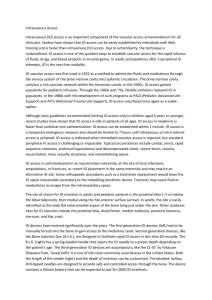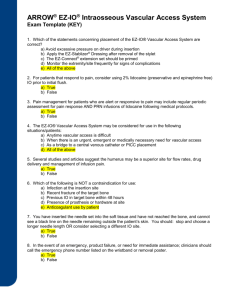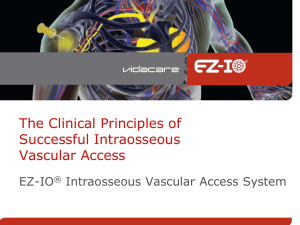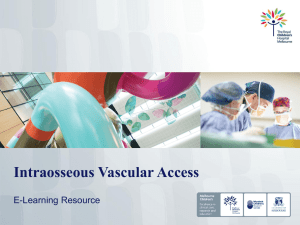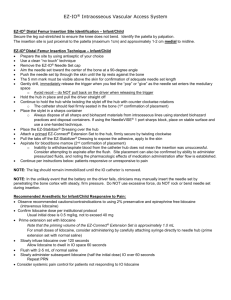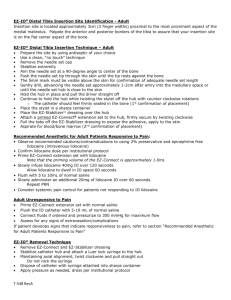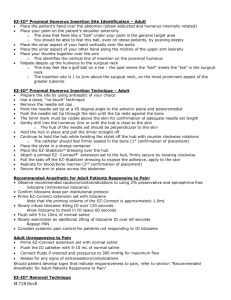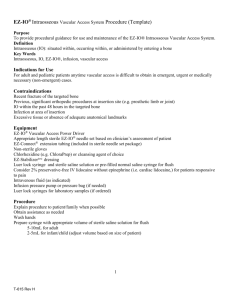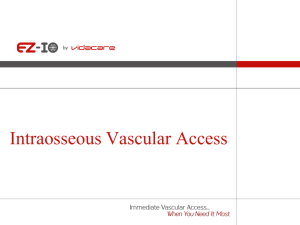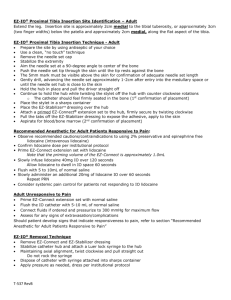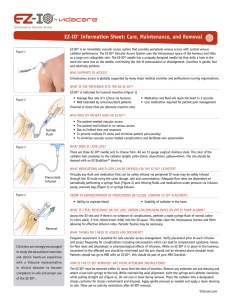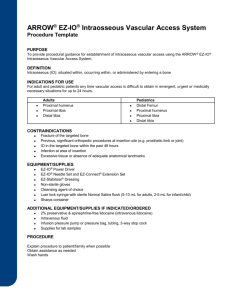EZ-IO Checklist Documentation Form
advertisement
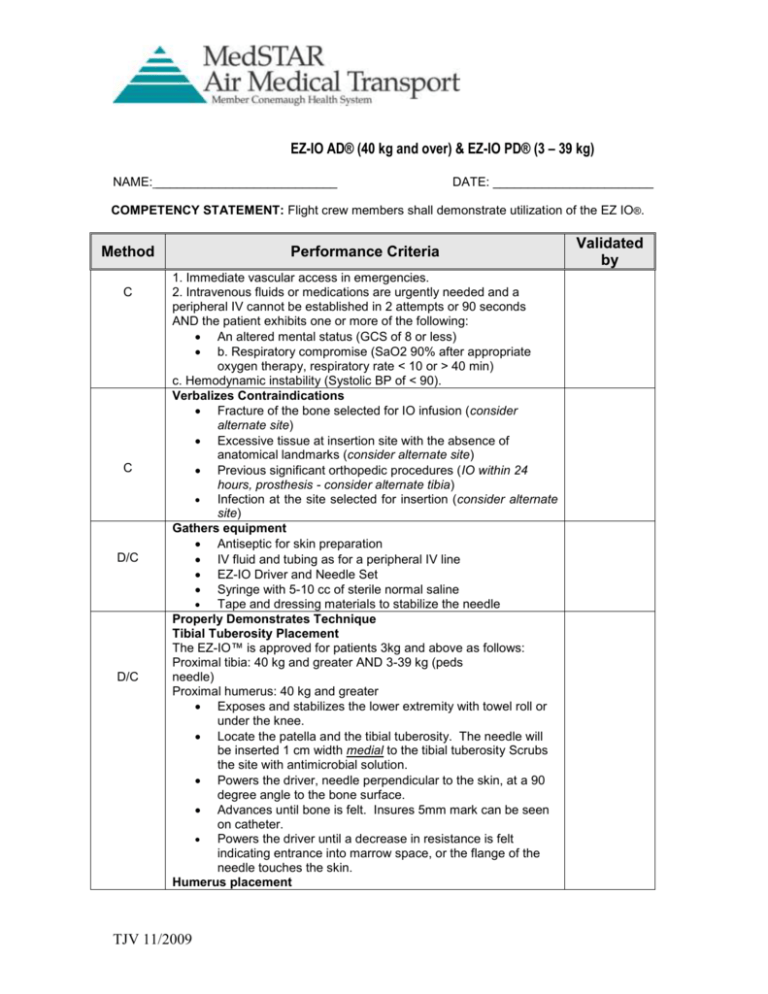
EZ-IO AD® (40 kg and over) & EZ-IO PD® (3 – 39 kg) NAME: __________________________ DATE: _______________________ COMPETENCY STATEMENT: Flight crew members shall demonstrate utilization of the EZ IO®. Method C C D/C D/C Performance Criteria 1. Immediate vascular access in emergencies. 2. Intravenous fluids or medications are urgently needed and a peripheral IV cannot be established in 2 attempts or 90 seconds AND the patient exhibits one or more of the following: An altered mental status (GCS of 8 or less) b. Respiratory compromise (SaO2 90% after appropriate oxygen therapy, respiratory rate < 10 or > 40 min) c. Hemodynamic instability (Systolic BP of < 90). Verbalizes Contraindications Fracture of the bone selected for IO infusion (consider alternate site) Excessive tissue at insertion site with the absence of anatomical landmarks (consider alternate site) Previous significant orthopedic procedures (IO within 24 hours, prosthesis - consider alternate tibia) Infection at the site selected for insertion (consider alternate site) Gathers equipment Antiseptic for skin preparation IV fluid and tubing as for a peripheral IV line EZ-IO Driver and Needle Set Syringe with 5-10 cc of sterile normal saline Tape and dressing materials to stabilize the needle Properly Demonstrates Technique Tibial Tuberosity Placement The EZ-IO™ is approved for patients 3kg and above as follows: Proximal tibia: 40 kg and greater AND 3-39 kg (peds needle) Proximal humerus: 40 kg and greater Exposes and stabilizes the lower extremity with towel roll or under the knee. Locate the patella and the tibial tuberosity. The needle will be inserted 1 cm width medial to the tibial tuberosity Scrubs the site with antimicrobial solution. Powers the driver, needle perpendicular to the skin, at a 90 degree angle to the bone surface. Advances until bone is felt. Insures 5mm mark can be seen on catheter. Powers the driver until a decrease in resistance is felt indicating entrance into marrow space, or the flange of the needle touches the skin. Humerus placement TJV 11/2009 Validated by D/C D/C Adduct the humerus then posteriorly locate the elbow toward the back rest of your chair (or floor if you are laying down). Next, place the patient’s hand on the patient’s abdomen – at near the umbilicus. This will provide for a more prominent insertion site as well as ensure protection for the vital neurovascular structures located under the patient’s arm. Palpate and identify the mid-shaft humerus and continue palpating toward the proximal aspect or humeral head. With the opposite hand you may consider “pinching” the anterior and inferior aspects of the humeral head while confirming the identification of the greater tubercle. Stabilize the arm and place the powered EZ-IO AD® maintaining a 90 degree angle during the insertion process. Distal Tibia (anterior or most forward lowerleg bone) and the Medial Malleolus (medial ankle bone or protrusion) Note that the insertion site is two finger widths proximal to the Medial Malleolus and positioned midline on the medial shaft. Confirmation of Placement Confirms marrow placement by removing the stylet and aspirating blood and bone marrow. Palpates for posterior infiltration with one hand while flushing saline without resistance. If unable to flush, advances the needle further with the trocar in place and then retests. If posterior infiltration is palpated, the needle must be removed. Connects the appropriate IV equipment. Considers pressure bag for easier infusion. Stabilizes the entire Intraosseous set-up with Kling or 4X4s & tape. Pain: Insertion of the EZ-IO AD® & EZ-IO PD® in conscious patients has been noted to cause mild to moderate discomfort (usuallyno more painful than a large bore IV). However, IO Infusion for conscious patients has been noted to cause severe discomfort • Prior to IO syringe bolus (flush) or continuous infusion in alert patients, SLOWLY administer Lidocaine 2% (Preservative Free) through the EZ-IO hub. Ensure that the patient has not allergies or sensitivity to Lidocaine. _ EZ-IO AD® Slowly administer 20 – 40 mg Lidocaine 2% (Preservative Free) _ EZ-IO PD® Slowly administer 0.5 mg /kg Lidocaine 2% (Preservative Free) Identifies fluids/medications that can be administered IO All blood and/or crystalloid solutions Any VCU Life Evac approved IV medications may be administered via IO lines TJV 11/2009 C C Identifies complications Osteomyelitis Sepsis Fat embolism Marrow damage Fracture Critical Points Do Not use driver to remove needle set Do not attempt a second IO in the same extremity as a failed attempt. Key: D =Demonstration C = Cognitive Resource: Vidacare EZ IO Training Manual Method of Validation Training or Simulation Signature of Instructor ________________________________________ TJV 11/2009 Initial
